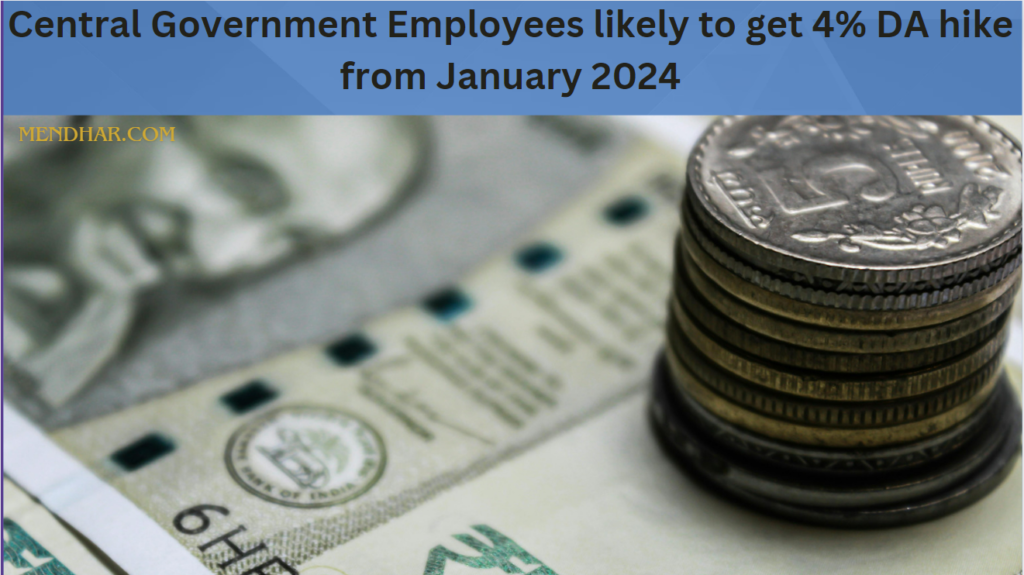Table of Contents
ToggleCentral Government Employees Anticipate 4% DA Hike from January 2024: What You Need to Know

The buzz surrounding the potential 4% DA hike for central government employees from January 2024 is gaining momentum, following the release of the latest Consumer Price Index for Industrial Workers (CPI-IW) by the Labor Bureau. These CPI-IW figures indicate a promising rise in Dearness Allowance (DA), poised to elevate the financial prospects of millions of central government employees across the nation.
The Latest CPI-IW Figures and Its Implications:
The December 2023 CPI-IW figures, though witnessing a slight dip, are set to propel the Dearness Allowance for central government employees to 50%, representing a 4% hike in the DA rate. Despite the 0.3-point decline in the All India Consumer Price Index (AICPI) to 138.8, the index remains on track to reach the threshold of 50% of the employee discount rate, signaling an imminent increase in DA.
Impact on Employees' Salaries and Pensions:
Currently standing at 46%, the impending increase in DA to 50% holds profound implications for the overall remuneration of central government employees and pensions for pensioners. This significant hike in DA would translate into a substantial boost in salaries and pension amounts, thereby enhancing the financial well-being of employees and retirees alike.

Automatic Adjustments in Other Allowances:
The anticipated DA hike is also expected to trigger automatic adjustments in other allowances such as House Rent Allowance (HRA) and Children Education Allowance (CEA) in accordance with government regulations. These adjustments aim to ensure parity and adequacy in the compensation structure for central government employees, further augmenting their financial stability.
Awaiting Official Announcement:
While the prospects of a 4% DA hike are promising, the official announcement regarding the revised DA rate is yet to be made by the government. Typically disclosed by the end of March, central government employees and pensioners eagerly await clarity on the impending DA hike and its implementation from January 2024 onwards.
Implications of the Impending Increase in Dearness Allowance (DA) to 50% for Central Government Employees and Pensioners:
Currently standing at 46%, the impending increase in Dearness Allowance (DA) to 50% holds profound implications for the overall remuneration of central government employees and pensions for pensioners. This significant hike in DA would translate into a substantial boost in salaries and pension amounts, thereby enhancing the financial well-being of employees and retirees alike.
1. Boost in Salaries: Central government employees are set to experience a notable enhancement in their take-home pay with the rise in DA. The increase from 46% to 50% in DA directly impacts the basic pay component of employees’ salaries. This boost in salaries not only acknowledges the rising cost of living but also serves as a recognition of employees’ contributions and dedication to their roles within the central government.
2. Financial Stability: The impending hike in DA brings about increased financial stability for central government employees and their families. With inflationary pressures and the ever-changing economic landscape, this rise in DA ensures that employees can maintain a certain standard of living and meet their financial obligations without undue strain.
3. Pension Enhancement: Pensioners, too, stand to benefit significantly from the increase in DA. As the DA is a crucial component of the pension calculation formula, the rise from 46% to 50% will lead to a considerable increase in pension amounts. This enhancement in pension serves as a form of recognition for retirees’ years of service and dedication to the central government.
4. Economic Impact: Beyond the individual level, the increase in DA has broader economic implications. With higher disposable incomes, central government employees and pensioners may contribute to increased consumer spending, which in turn can stimulate economic growth and demand in various sectors of the economy.
5. Overall Well-being: Ultimately, the hike in DA to 50% contributes to the overall well-being and financial security of central government employees and pensioners. It not only addresses the immediate need for higher remuneration but also reaffirms the government’s commitment to ensuring the welfare of its workforce, both active and retired.
Anticipated Increases in Other Allowances:
Furthermore, once the DA crosses the 50% threshold, certain allowances and pay components are expected to increase as per the recommendations of the 7th Pay Commission. These adjustments are poised to provide additional financial relief and support to central government employees in meeting their diverse needs and obligations.
Conclusion:
As central government employees await the official announcement regarding the anticipated 4% DA hike from January 2024, there is a palpable sense of anticipation and optimism within the community. The potential increase holds the promise of significantly enhancing employees’ salaries and pensions, thereby fostering greater financial stability and well-being. With expectations running high, employees eagerly await the government’s official announcement, which is anticipated to bring clarity and reassurance regarding the impending DA hike.
Add Your Heading Text Here
Q: What is the 4% hike in salary for employees of the central government?
A: The 4% hike in salary refers to an increase in the basic pay of employees working for the central government, effective from January 1, 2024.
Q: Who is eligible for this salary hike?
A: This salary hike applies to employees of the central government across various departments and ministries, including but not limited to civil servants, defense personnel, and other central government employees.
Q: Why is this salary hike being implemented?
A: The salary hike is typically implemented as part of periodic revisions to ensure that government employees receive adjustments in line with inflation and rising costs of living. It’s aimed at maintaining the purchasing power of government employees’ salaries.
Q: How will the 4% hike impact employees’ take-home pay?
A: The 4% hike will increase the basic pay component of employees’ salaries. As a result, their take-home pay will increase, albeit slightly, depending on their current salary structure and tax deductions.
Q: Will this hike apply to all government employees equally?
A: Yes, the 4% hike in salary is typically applied uniformly to all eligible government employees across different ranks and positions.
Q: Will there be any changes in other allowances or benefits as a result of this hike?
A: Depending on government policies and negotiations with employee unions or associations, there may be additional adjustments or revisions in allowances, benefits, or perks to complement the salary hike.
Q: How is the hike determined, and is it subject to revision?
A: The decision to implement a salary hike, including the percentage increase, is usually based on recommendations from government-appointed committees or commissions. These decisions are subject to periodic reviews and revisions based on economic factors and government policies.
Q: Where can employees find more information about the salary hike and its implications?
A: Employees can refer to official notifications or circulars issued by the central government’s relevant departments or ministries. Additionally, they can seek clarification from their respective human resources or administrative departments for detailed information about the salary hike and any related updates.


Pingback: Happy Retirement Quotes in English - Mendhar.com
Pingback: Income Tax Slab FY 2023-24 - Mendhar.com
Pingback: Retirement Quotes for Teachers - Mendhar.com
Pingback: Nishtha 4.0 ECCE Diksha Course 5 Quiz Answer Key 2023 - Mendhar.com
Pingback: Understanding the New Income Tax System: Essential Information - Mendhar.com
Pingback: The Impact of DA Hiked to 50% for Central Government Employees: -